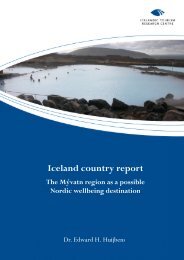Untitled
Untitled
Untitled
You also want an ePaper? Increase the reach of your titles
YUMPU automatically turns print PDFs into web optimized ePapers that Google loves.
The IPCC Reports are based on reaching scientific and political<br />
consensus. The panel is the most authoritative body monitoring climate<br />
change and has had an enormous impact on public understanding and<br />
political concern. It is now claimed by the IPCC that climate change is<br />
“unequivocal” and that the warming of the Earth´s climate is related to the<br />
effects of “non-natural” causes. Although there are still sceptics around,<br />
the IPCC states that there is “very high confidence that the net effect of<br />
human activities since 1750 has been one of warming” (IPCC 2007, p. 5).<br />
In essence climate change in terms of warming then:<br />
refers to the fact that greenhouse gas emissions produced by modern<br />
industry are causing the Earth’s climate to warm, with potentially<br />
devastating consequences for the future (Giddens 2009, p. 1).<br />
One of the real worries among many scientists is that the warming<br />
of the climate may reach a “tipping point” (Gladwell 2000), leading the<br />
climate system to violently and rapidly convert to a new equilibrium, with<br />
potentially catastrophic consequences for life on Earth as we have come to<br />
know it. For example, in a recent book by Lovelock we are confronted<br />
with the frightening scenario of the human population declining en masse,<br />
“leaving an impoverished few survivors in a torrid society ruled by<br />
warlords on a hostile and disabled planet” (Lovelock 2006, p. 151). The<br />
dystopic vision delivered by Lovelock may be extreme, but is<br />
unfortunately not so easy to dismiss. According to what represents a more<br />
mainstream opinion, the consensus of IPCC claims that:<br />
Anthropogenic warming could lead to some impacts that are abrupt or<br />
irreversible, depending upon the rate and magnitude of the climate<br />
change (IPCC 2007, p. 13).<br />
The political system has reacted to the scale and urgency of the<br />
problem and many countries are now in the process of attempting to<br />
introduce ambitious climate change policies. International summits and<br />
negotiations aimed at limiting global warming have and will take place<br />
(for example those organised by the United Nations in Rio in 1992, Kyoto<br />
in 1997, Bali in 2007 and the summit in Copenhagen 2009). Around the<br />
world there are many organisations, and even a few governments, making<br />
it clear that:<br />
76
















